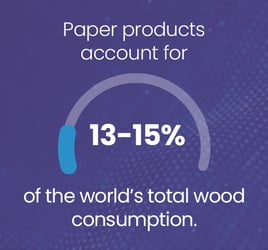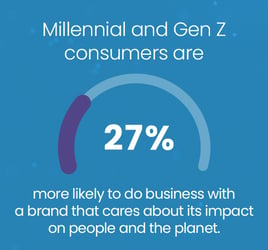Achieving Sustainability Goals Through Digitization
Environmental sustainability and document digitization are two of the hottest – and related – business initiatives in the world today. As businesses strive to align with environmental regulations and their own sustainability goals, the move to a paperless workplace becomes increasingly important. Through digital document transformation, organizations can convert their outdated paper document processes into secure, digital files and information management systems. This digital transformation results in a more efficient, affordable, and eco-friendly business model that benefits their bottom line as well as the planet.
The Environmental and Business Benefits of Digitization
Saves Costs
For many businesses, one of the key benefits of going paperless is the significant reduction in operational costs. Paper-based processes come with a variety of expenses, including printing, storage, and distribution. With digitized documents, businesses can streamline their operations, eliminate printing costs, and drastically reduce the need for storage space.
Eliminates Clutter
What’s the best way to get rid of paper documents? Converting paper to digital is one of the top ways to reduce paper usage. Companies that convert documents to electronic files eliminate clutter by committing to a paperless document management system. The process of paperless scanning and archiving allows businesses to recycle old paper, assisting with sustainability efforts while freeing up valuable office space. Moreover, employees benefit from a cleaner work area, which can contribute to increased productivity. Once the digital transformation is underway at your organization, avoiding paper becomes part of the day-to-day process.
Creates Efficiency
Another benefit of digitization is that document management systems can make documents searchable. For businesses, paperless document management means less time searching through dozens of filing cabinets and folders. Instead, an employee can search for a specific keyword and bring up all relevant files. Additionally, many digital processes can easily be automated, minimizing the amount of work a human needs to perform. By reducing the amount of oversight and labor needed to perform jobs, workers can place more of their efforts into strategic tasks that will help the business grow.
Increases Accessibility
Digital documents provide unparalleled accessibility, enabling employees to access information from anywhere. Cloud-based solutions facilitate real-time collaboration, allowing teams to work in tandem even when in different locations. This freedom is especially important in today's remote-friendly work environments. As an added benefit, the ability to work remotely has caused carbon emissions from commuters to plummet, resulting in a notable reduction in the overall carbon footprint of businesses. This shift not only benefits the environment by decreasing our reliance on fossil fuels to power vehicles but also improves the work-life balance of employees.
Improves Security
Paper documents are susceptible to loss, theft, and damage. Converting to paperless systems helps to enhance document security through a variety of means including encryption, specified user access, and regular file backups. Digital document management systems also provide a secure storage environment, ensuring that sensitive information is protected from unauthorized access. This not only minimizes the risk of data breaches but also ensures compliance with data protection regulations and policies.
Ensures Regulatory Compliance
Businesses across a variety of industries are subject to strict regulatory requirements regarding document management and data privacy, especially as privacy laws like GDPR become more widespread. Digitization enables organizations such as legal firms, financial institutions, and government agencies to implement robust compliance measures to meet or even exceed these policies. Digital document management systems will often have features such as audit trails, version control, and secure user permissions, ensuring that businesses can easily comply with industry regulations and legislation.
Conserves Resources

The environmental impact of paper production is staggering, contributing to significant levels of deforestation and carbon emissions. According to the World Wildlife Fund, paper products account for 13–15% of the world’s total wood consumption. Going paperless aligns with corporate social responsibility goals, demonstrating a commitment to sustainability. By reducing paper consumption, businesses can decrease their carbon footprint, help to conserve natural resources, and ultimately contribute to a healthier planet. This eco-friendly approach not only resonates with environmentally conscious consumers but also enhances the company's overall reputation.
Enhances Reputation

For consumers, sustainability is becoming an increasingly important factor in their perception of a business, contributing to their decision to engage with the company. According to a study by the Harvard Business Review, by 2030 sustainable business models will be considered a basic expectation for companies, serving as a major deciding factor when making purchases. That same study showed that even today, the younger generation of consumers consider sustainability as a factor in their purchasing decision. The study states Millennial and Gen Z consumers are 27% more likely to make a purchase when they feel a brand cares about its impact on people and the planet than older generations are. Businesses who adopt environmentally friendly practices now will be positioned in a much more favorable light than those who wait.
Digitization Supports Sustainability and Competitive Business Practices
The decision to go paperless is more than just a technological upgrade; it's a strategic shift that can transform the way businesses operate. From increased profitability and improved security to meeting sustainability goals and boosting a business’s reputation, the benefits of digitization are clear. The move towards a paperless model not only positions an organization as forward-thinking but also provides them with the tools and processes to thrive in an increasingly competitive and eco-conscious market.
Begin Your Transition to a Paperless Workplace with Scan-Optics
Scan-Optics has been helping businesses in all types of industries manage data more effectively for over 55 years. From innovating digital processes to implementing the latest technology, we partner with organizations to transform the way they work. With our document scanning and conversion services, all of your organization’s hardcopy documents, files, and records are scanned and converted into digital formats. This conversion protects and preserves your organization’s information while also making your documents searchable and actionable. Speak to one of our digitization experts today to learn how Scan-Optics can help your organization begin its transformation to a more sustainable, paperless workplace.
